Article
Strizhova, Ekaterina A. (2016). Dynamics of motivation before and after job placement. National Psychological Journal. 1, 78-87.
Abstract
The paper presents results of the study focused on the work motivation dynamics. Participants were candidates for the job, accepted on probation period in finance company. The influence of the “Money“» motivation object on the motivational space before and after job placement, an attempt to operationalize situational and temporal stability of work motivation are presented. The study was conducted using method of “Motivational map“, based on the motivational task procedure (Strizhova, Gusev, 2013). Motivational task is a tool for consistent reflection of the field of motivational objects allowing further reconstruction of individual motivational space. The material stimulation is confirmed to have a significant impact on more parameters of motivational space before job placement than after job placement.
Situational stability of work motivation was assessed by correlation between coordinates of 15 motivational objects obtained in the two steps of motivational task. At the first step participant assessed 15 motivational objects in the graphic space of evaluation scales. At the second step participant placed motivational object “Money“ among already evaluated 15 motivational objects, which could be reevaluated after it. Temporal stability was assessed by correlations between the same parameters of motivational space before and after job placement.
The research results helped to assume that situational and temporal stability of motivation could be the factors of individual differences.
Accepted: 02/16/2016
Pages: 78-87
DOI: 10.11621/npj.2016.0110
PDF: Download
Keywords: work motivation; motivation dynamics; motivation map;
Available Online 06.07.2016
|
Variables: motivational coordinates of objects on the rating scales |
Student's T-test for paired samples |
T-Value test (2-sided) |
Wilconxon Value |
Wilconxon Value |
Kolmogorov-Smirnov Value test |
Kolmogorov-Smirnov Value retest |
|
|
Evaluation Scale |
Motivation Object |
|
|
|
|
|
|
|
Test Results |
|||||||
|
Importance* |
Stability, confidence in the future |
х |
х |
-2.143 |
0.032 |
0.004 |
0.009 |
|
Importance |
Career |
2.266 |
0.027 |
х |
х |
0.066 |
0.257 |
|
Importance |
Avoiding conflict situations |
2.288 |
0.025 |
х |
х |
0.165 |
0.432 |
|
Importance |
Family well-being |
х |
х |
-2.434 |
0.015 |
0.001 |
0.009 |
|
Importance |
Professional and personal development |
х |
х |
-2.563 |
0.010 |
0.057 |
0.029 |
|
Success probability |
Stability, confidence in the future |
х |
х |
-4.665 |
0.000 |
0.274 |
0.013 |
|
Success probability |
Career |
4.089 |
0.000 |
х |
х |
0.373 |
0.132 |
|
Success probability |
Interesting job, where I can actualize myself |
3.583 |
0.001 |
х |
х |
0.547 |
0.105 |
|
Success probability |
Being useful to people |
2.333 |
0.023 |
х |
х |
0.317 |
0.181 |
|
Success probability |
Work results |
х |
х |
-2.290 |
0.022 |
0.022 |
0.065 |
|
Success probability |
Avoiding conflict situations |
3.658 |
0.000 |
х |
х |
0.185 |
0.179 |
|
Success probability |
Organizing and optimizing work |
2.69 |
0.009 |
х |
х |
0.264 |
0.127 |
|
Success probability |
Recognizing my achievements |
2.582 |
0.012 |
х |
х |
0.508 |
0.201 |
|
Success probability |
Being inspired and satisfied by work |
2.75 |
0.008 |
х |
х |
0.134 |
0.158 |
|
Success probability |
Professional and personal development |
3.365 |
0.001 |
х |
х |
0.173 |
0.086 |
|
Success probability |
Respect of colleagues |
2.114 |
0.038 |
х |
х |
0.235 |
0.130 |
|
Трудность |
Avoiding conflict situations |
-2.571 |
0.012 |
х |
х |
0.045 |
0.067 |
|
Трудность |
Organizing and optimizing work |
-2.289 |
0.025 |
х |
х |
0.710 |
0.450 |
|
Cause |
Job dismissal |
2.062 |
0.043 |
х |
х |
0.152 |
0.067 |
|
Cause |
Family well-being |
-2.035 |
0.046 |
х |
х |
0.831 |
0.784 |
|
Retest Results |
|||||||
|
Importance |
Stability, confidence in the future |
х |
х |
-0.845 |
0.398 |
0.003 |
0.005 |
|
Importance |
Career |
х |
х |
-0.585 |
0.559 |
0.015 |
0.024 |
|
Importance |
Being useful to people |
-1.859 |
0.067 |
х |
х |
0.620 |
0.606 |
|
Success probability |
Stability, confidence in the future |
2.415 |
0.018 |
х |
х |
0.252 |
0.065 |
|
Success probability |
Career |
1.964 |
0.053 |
х |
х |
0.191 |
0.120 |
|
Success probability |
Recognizing my achievements |
1.694 |
0.095 |
х |
х |
0.776 |
0.760 |
|
Efforts |
Interesting job, where I can actualize myself |
1.851 |
0.068 |
х |
х |
0.242 |
0.201 |
|
Efforts |
Being inspired and satisfied by work |
2.862 |
0.006 |
х |
х |
0.796 |
0.747 |
|
Efforts |
Professional and personal development |
1.886 |
0.063 |
х |
х |
0.369 |
0.545 |
|
Cause |
Family well-being |
-1.777 |
0.080 |
х |
х |
0.122 |
0.282 |
|
* Italic denotes variables, matching both series of the study |
|||||||
Table 1. Results of the effect of high-priority evaluation of the motivation object «Money» on the parameters of intangible motivation objects scale score (based on normal distribution option), presented to the two series of studies.
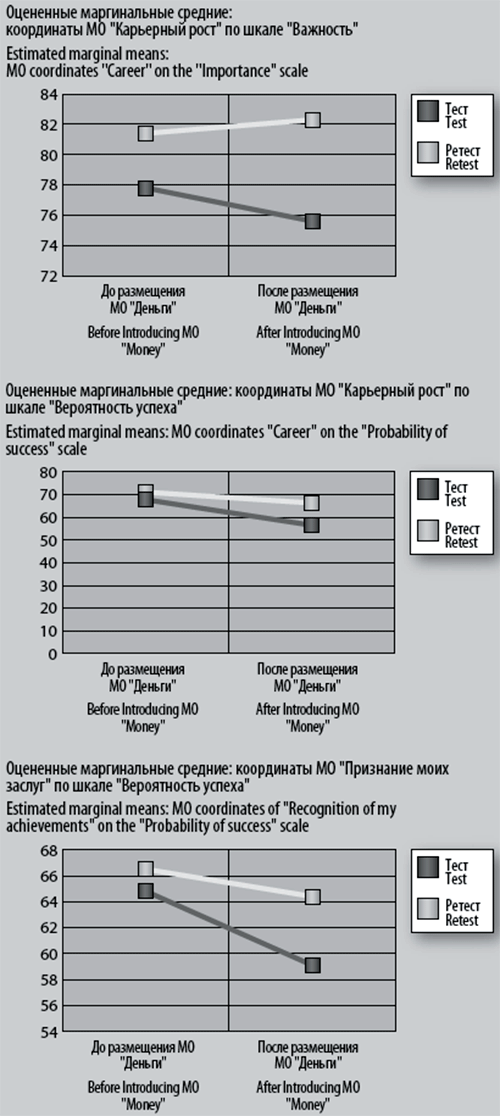
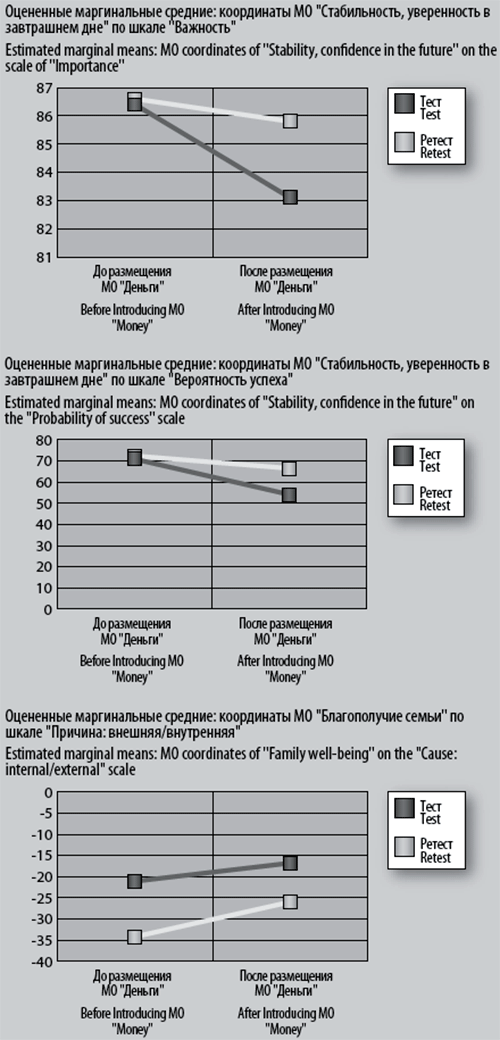
Fig. 1 Effect of motivation object ‘Money’ on the coordinates of the motivation objects considering the time factor (test/retest). Abbreviations: MO - motivational object.
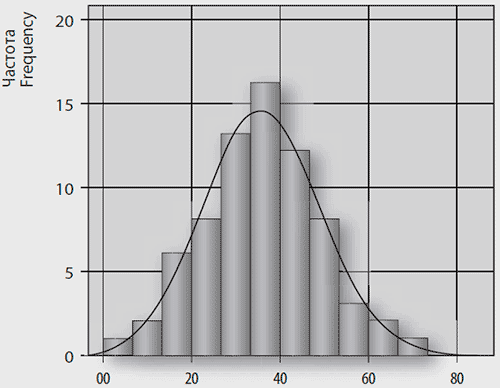
Fig. 2. The distribution of correlated coefficients of motivation objects coordinates obtained when comparing two sections: before and after introducing «Money» object of the main series.
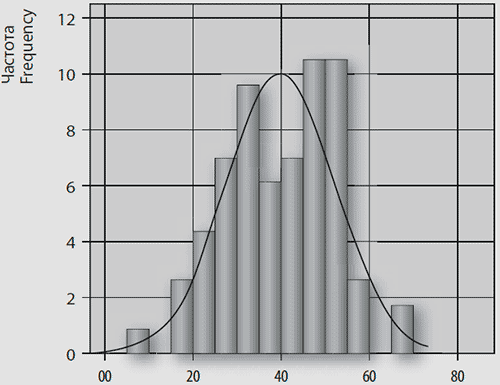
Fig. 3. The distribution of correlated coefficients of motivation objects coordinates obtained when comparing two sections: before and after introducing «Money» object at the stage of the retest.
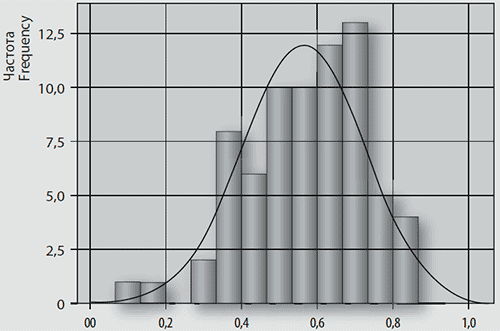
Fig. 4 The distribution of correlated coefficients of motivation object coordinates obtained when comparing two sections: before introducing
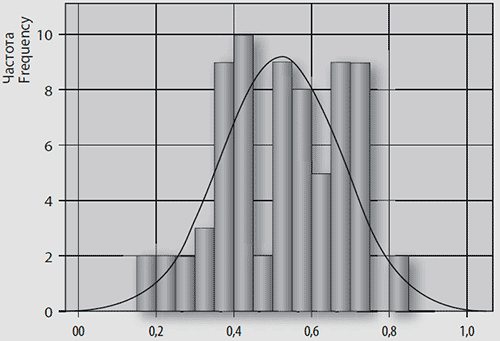
Fig. 5 The distribution of correlated coefficients of motivation objects coordinates obtained when comparing two sections: after introducing
References:
Barabanshchikova V.V., & Klimova O.A. (2015). Representations of work engagement and workaholism in modern psychological research. National psychological journal [Natsional’nyy psikhologicheskiy zhurnal], 1, 52-60. DOI: 10.11621/npj.2015.0106
Fleisher, S. (2009) Motivation and Self-Regulated Learning: Theory, Research, and Applications. International Journal for the Scholarship of Teaching and Learning. Vol. 3. 1. 4-26.
Galbraith, J.K. (2008) New Industrial State. Moscow, Eksmo, 1198.
Gordeeva, Т. О. (2014) Basic types of motivation of the human activity: Needbased model. Moscow University Psychology Bulletin. Series 14. Psychology, 3, 63-78.
Ivannikov V.A. (2014). Analysis of motivation from the viewpoint of the activity theory. National psychological journal, 1, 49-56. DOI: 10.11621/ npj.2014.0105
Ivannikov, V.A. (2015) A generation of activity and the problem of motivation. Moscow University Psychology Bulletin. Series 14. Psychology, 2, 15-22.
Karpov, A.V. (2005) Labour Psychology. Moscow, VLADOS, 352.
Klimov, E.A. (2002) Individual style of activity. Psychology of individual differences [Psikhologiya individual’nykh razlichiy]. (eds.) Gippenreiter, Yu.B., & Romanova, V.Ya. Moscow, CheRo, 140-143.
Lewin K. (2001) Dynamic Psychology. Moscow, Smysl, 527.
Lewin, K. (2008) Resolving social conflicts & Field theory in social science. Washington, D.C., American Psychological Association. 112-230.
Leontiev, A.N. (2004) Activities. Consciousness. Personality. Moscow, Smysl, Akademiya, 352.
Markova, A.K. (1996) Psychology of professionalism. Moscow, Znanie. 308.
Meskon, M. (1999) Principles of Management. Moscow, Delo, 800.
Noskova, О. G. (2014) General psychological theory of activity and problems of the work-psychology. Moscow University Psychology Bulletin. Series 14. Psychology, 3, 104-121
Nuttin, J., & Lens W. (1985) Future Time Perspective and Motivation: Theory and Research Method. Leuven University Press and Erlbaum, Leuven, Belgium and Hillsdale, NJ, 25-130.
Nuttin J. (2004) Motivation, action and the prospect of future. Moscow, Smysl.
Pinder, C.C. (2008) Work motivation in organizational behavior. N.Y., Psychology Press, 587.
Strizhova E.À., Gusev A.N. (2014) Diagnostics of work motivation in situation of solving task: methodology and method. National Psychological Journal [Natsional’nyy psikhologicheskiy zhurnal], 2, 52-59 DOI: 10.11621/npj.2014.0207
Shadrikov, V.D. (1982) Issues of system genesis in professional activity. Moscow, Nauka.
Shakhova, V.A. (2006) Motivation of labour activity: teaching method: Manual. Moscow: RAP.
Zankovskiy, A.N. (2002) Organizational Psychology: Textbook/manual for schools. Moscow, Flint, SAG.
For citing this article:
Strizhova, Ekaterina A. (2016). Dynamics of motivation before and after job placement. National Psychological Journal. 1, 78-87.


